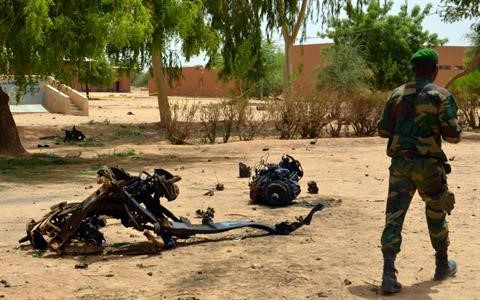 Recent attacks in Niger show that the country has become more vulnerable to jihadist activity originating in several neighboring countries. Although Niger traditionally has had conflicts with Tuareg tribes in the north and several foreign nationals have been kidnapped within its territory, current regional developments are fueling more jihadist activity in the country. The role of Nigerien servicemen in security operations in northern Mali, along with the presence of a few foreign assets that are softer targets than military assets in Mali, make Niger a beneficial area of operations for jihadists in the Sahel.
Recent attacks in Niger show that the country has become more vulnerable to jihadist activity originating in several neighboring countries. Although Niger traditionally has had conflicts with Tuareg tribes in the north and several foreign nationals have been kidnapped within its territory, current regional developments are fueling more jihadist activity in the country. The role of Nigerien servicemen in security operations in northern Mali, along with the presence of a few foreign assets that are softer targets than military assets in Mali, make Niger a beneficial area of operations for jihadists in the Sahel.
The regional dynamics aggravating the threat in Niger have been influenced most recently by the French military intervention in northern Mali that pushed many jihadists across Mali's borders. Niger was an active player in the planning and execution of the African military intervention to northern Mali. These operations pitted Nigerien armed forces directly against the Movement for Unity and Jihad in West Africa in the Gao region of Mali, and now the Nigerien forces are targets for retaliation by jihadist organizations.
Prior to its involvement in the conflict in northern Mali, bomb attacks did not occur in Niger. However, the Movement for Unity and Jihad in West Africa claimed to have planned and carried out the simultaneous car bombings at a French uranium mining facility and a military barracks in Niger on May 23 in cooperation with Mokhtar Belmokhtar's "Masked Ones." Both groups are offshoots of al Qaeda in the Islamic Maghreb and are known to overlap and collaborate.
Belmokhtar's activity also highlights the links between militant actions in Niger and militancy in Algeria, where his group carried out the attack on the Ain Amenas natural gas facility Jan. 16, and to militancy in Libya and Mali, where Belmokhtar was active previously. Belmokhtar also was responsible for an attack on the uranium mine in Arlit in September 2010 in which fighters under his command took several French hostages. However, the most recent attacks in Niger have focused on causing damage rather than kidnapping foreigners for ransom.
The continuing insecurity in southern Libya, especially in the vast area bordering Algeria and Niger, is allowing jihadists to operate freely in the wider region where border security is lacking and geography and diverging national interests hamper multilateral cooperation to contain militants. The activity of jihadist groups is not new across the Sahel region, but the lack of security in Libya since the fall of Moammar Gadhafi's regime has given militants greater access to weapons and sanctuary.
Niger also borders northern Nigeria, where militant groups Boko Haram and Ansaru operate. Although neither of these groups has been known to stage attacks within Niger yet, there have been cases of Boko Haram members escaping Nigerian security forces by crossing the border into Niger. Moreover, there have been allegations of Nigeriens fighting among Nigerian militants and that Boko Haram fighters in northern Mali likely used Niger as a route. Niger's proximity to areas in Nigeria and Mali that are rife with militancy, the mobility of militants between those areas, the difficulty of securing borders in the wider Sahel region and the presence of appealing targets for militants in Niger all contribute to the increasing risk of militant activity in the country.
Foreign companies operating in Niger, mostly in the uranium-mining sector, bring foreign civilians to the country, where foreigners have been targeted in kidnappings and extortion schemes. French assets, which have become a higher priority for militants after the French military intervention in Mali, are located throughout the country. France's uranium-mining facilities are tempting and potentially easy targets for jihadists -- as the recent attack in Arlit showed -- especially because of their added economic significance. Moreover, during French operations in Mali, the United States selected Niger as a base for unmanned aerial vehicles operating in the region. This not only presents militants with another target but also raises Niger's profile overall.
France has responded to the rising militant threat across the Sahel by allocating more funds for the security and infrastructure of its embassies after a car bomb severely damaged the French Embassy in Tripoli, Libya, on April 23. The United States has responded by offering rewards for information leading to the capture of several al Qaeda in the Islamic Maghreb members as well as Belmokhtar and Boko Haram leader Abubakar Shekau, but the effectiveness of rewards offers is limited.
The continuing military presence in Mali, as well as the use of Niger as a logistical staging point during the initial deployment and the presence of U.S. unmanned aerial vehicle operations, will continue to make Niger -- and foreign assets located within it -- both a symbolic and pragmatic target. The May 23 attacks emphasize the importance of securing facilities and of efforts by Nigerien security services to detect and prevent such attacks, although the May 23 bombings were not greatly successful from a tactical perspective.
For the broader region, militancy will pose a threat as long as diverging interests prevent a regionwide approach to eliminating the persistent presence of jihadists. The porous borders between countries in the Sahel will continue allowing the militants, and the potential for attacks, to extend across the region.
Courtesy : Stratfor (www.stratfor.com)